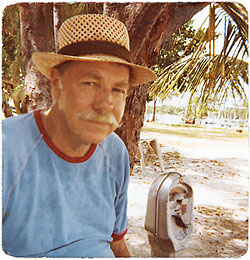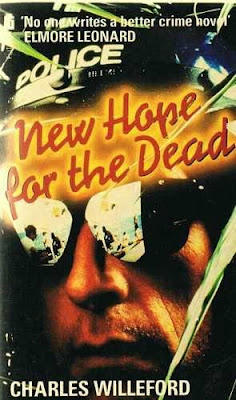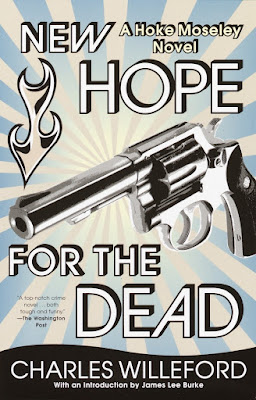Were
Hoke Moseley a cop in the rural South it could be said of him, Thet
boy’s inna heapa trouble, son (the “son” thrown in just for its
sound). The list of his troubles is so long I’m liable to forget
one or two, or more, but I’ll start with the most obvious:
he’s a homicide
sergeant
in Miami living in a dump hotel outside his department’s
jurisdiction. As he tells his two teenage daughters, who’ve dropped
in unexpectedly on him (another of his troubles), “South Beach is
now a slum, and it’s a high-crime area, so I don’t want you girls
to leave the hotel by yourselves. If you had a doll, and you left it
out overnight on the front porch of the hotel, it would probably be
raped when you found it in the morning.”
He
has two weeks to find a permanent domicile within the jurisdiction,
or risk losing his job. Problems three and four are directly related
in a cause/effect way. He’s living in the dump hotel because he has
to send every other monthly paycheck to his ex, which doesn’t leave
him enough to afford a place in the city. The daughters’ arrival
removes the initial financial burden of the divorce, but now he must
find a place suitable for himself and
the girls and
Ellita
Sanchez, his
new unmarried Cuban partner whose father has kicked her out of the
family home after
learning
she was pregnant (not by Hoke—he’s
smarter
than that).
And
let us not forget, Hoke and Sanchez
and his former partner, Bill Henderson, have murders to solve. Lots
of them.
Most
immediately for Hoke and Ellita is the death of a young junkie of an
apparent overdose of high-quality heroin. Hoke suspects foul play,
however, plus he’s taken with the junkie’s attractive and
flirtatious stepmother. While probing into the death, and weighing
the fact he hasn’t had sex in four months, he cautiously proceeds
to woo the woman. Meanwhile,
there are fifty cold homicides the trio has been given two months to
solve. Take a moment, please, to absorb the implications of this
phenomenon.
Fifty
cold cases (providing
the novel’s title, New
Hope for the Dead).
The
case files were compiled
by Major Willie Brownley, who hopes cracking a few of these old
murders will help elevate him to one of eight colonelcies the new
police chief says he wants to create in lieu of pay increases. One
might think Brownley’s a stereotypical administrative jerk for
harboring this ambition, but he’s really a pretty good boss. He’s
the department’s first black major, and he figures this could be
his last chance for higher rank before retirement. “I didn’t
become the Homicide chief because I was a detective,” he tells
them, after assuring them he trusts their judgment as to which of the
old cases they have the best chance of solving. “I’m an
administrator, and I was promoted for my administrative ability. It
didn’t hurt that I was black, either, but I wouldn’t have kept my
rank if I couldn’t do the work.
“It
seems to me, if we can solve some of these cold cases, it’ll make
our division and the entire department look even better than it is.
And if that happens, they’ll have to make at least one of those new
colonels a black man. What I want is one of those silver eagles and
another gold stripe on my sleeve.”
The
team gets off to a great start, making progress on two of the cases
within a couple days. The first, when Henderson on his way to lunch
spots the suspect known as Capt. Midnight. The second when Sanchez
interviews a woman who claimed to have seen a girl whose bloody
clothing was found in a field some three years earlier. The witness
had changed her story with the male detective trying to interview her
at the time, and was written off as a “man hater.”
This
is the second of the Hoke Moseley series I’ve read. I’m hoping to
read the rest of them in sequence. I am totally hooked on the
character and on author Charles Willeford’s droll, yet realistic
voice. I was
enormously impressed by Willeford in my review of the first in the
series, Miami
Blues,
and see no need to restate the kudos here, although I can quote a
line or two from novelist James Lee Burke’s introduction to New
Hope for the Dead.
The two became friends while teaching at Miami-Dade Community
College:
“Early
on I became aware of his tremendous sense of humor, his wit, and his
ability to tell wonderful stories. But as I came to know Charles
better, I also began to realize his great reservoir of humanity, his
goodwill, his loyalty to his friends, and his modesty as a man, an
artist, and a decorated soldier.
“He
was one of the most extraordinary men I ever knew. He literally lived
history. He rode the rods when he was fifteen, lived in hobo jungles,
boxed as a club fighter, fought roosters, raised horses, enlisted in
the cavalry when he was sixteen, drove a tank in the worst battles of
the Bulge, won the Croix
de Guerre,
the Purple Heart, and the Silver Star.”
 |
| Willeford |
I
would be remiss not to add this line from the New
York Times Review of Books:
“If you are looking for a master’s insight into the humid
decadence of South Florida and its polyglot tribes, nobody does that
as well as Mr. Willeford.” After two novels now, and this, I’ve
no desire to visit any part of Miami. Ever.
What
I find most seductive about Willeford’s writing is his attention to
detail. I don’t mean the kind of monotonous descriptions of
furniture and buildings and landscapes and clothing and such that
seems de
rigueur
for novelists these days, following the common dictum that it’s
holier to show than merely to tell. Not saying Willeford skimps on
these details. Not at all. I definitely felt I’d been plunged into
“the humid decadence of South Florida and its polyglot tribes.”
Even turned on the A/C in my apartment in case some of that South
Florida mugginess happened to migrate north while I was reading about
it. Nope. There’s enough of that de
rigueur
detail in the two Hoke Moseley adventures I’ve read thus far,
enough to stimulate my imagination to fill in the blanks. What I mean
by “seductive” detail, is his depiction of the
ordinary
things
his characters do that most novelists glide over in the interest, I
suppose, of keeping up a narrative tempo. The kind of pace The
Village Voice
says is “so relentless, words practically fly off the page.” I’d
say that’s a tad over the top. The words don’t “fly,” but
they move along without getting bogged down in literary correctness.
Here’s an example that doesn’t seem like much, but left my jaw
agape:
The
waiter brought the conch chowder and the oysters on a tray. He also
gave them silverware, wrapped in paper napkins. He placed Loretta’s
wine spritzer in front of her. Hoke poured the last of the beer into
his glass and topped it off with a head from the fresh pitcher. The
waiter put the empty pitcher on his tray.
This
comes during one of the most suspenseful
scenes in the novel. It’s a perfect glance
away from the building tension,
focusing on the simple mechanics of service in a restaurant. We’re
not distracted by the brand of beer or wine spritzer or how
the waiter is dressed or looked. Non-essentials, those. It’s the
way I imagine Hemingway might have portrayed the little scene, with
us knowing all the while the deadly potential lurking nearby, perhaps
only seconds away. “The
waiter put the empty pitcher on his tray.” A
cinematic moment. Extreme closeup on the pitcher, the waiter’s
hand, and then the tray. All the while the tick
tick tick
of something we know is coming.
Genius,
I would say. But maybe I’m just easy.


I do want to read some books by Willeford someday, Mathew, but I have worried that his books may be too dark and gritty for me. You do make his writing sound very, very good.
ReplyDeleteIt's astounding, Tracy. I don't cotton to dark and gritty if the voice is dark and gritty, trying to shock. Willeford's writing is so full of wry humor the dark and gritty has a transient feel, not inevitable. The Kirkus reviewer said of it, “Willeford has a marvelously deadpan way with losers on both sides of the law.” His humor doesn't seem planned or obvious. It's just the voice of someone who knows the dark side but prefers the light. You'd love the series.
Delete